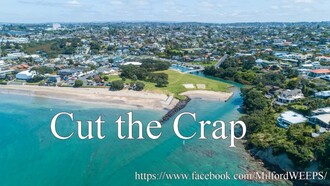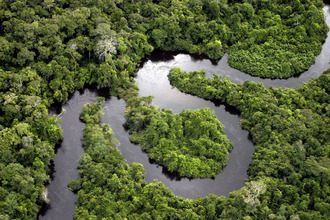-
Fix Wairau Estuary & Milford BeachNorth Shore beaches are the pride of Auckland and are of world renown. Wairau Estuary and Milford Beach are a regional resource. Large numbers of visitors from South and West Auckland enjoy them throughout summer. Yet Wairau Estuary is one of the most heavily contaminated waterways in Auckland. The contamination includes silt (that chokes seafloor life), human faecal contamination, heavy metals and hydrocarbons. Wairau Outlet has a permanent no swim warning. The only one north of the Harbour Bridge. There is human sewage in the Wairau Estuary. This contaminates Milford Beach. Heavy metals and hydrocarbons in the Estuary are carried with silt onto Milford and Castor Bay Beaches. High levels of Zinc, Lead, Copper, Cadmium, Chromium and Arsenic are present. Polyaromatic hydrocarbons cause cancer and are found in the sediment of Milford Beach in moderately elevated (amber zone) quantities. There is a total ban on gathering shellfish off the Wairau Outlet, because they contain human faecal matter. Council puts a red no swim advisory on any beach when 2 in every 100 swimmers are likely to get sick. Swimming illness is usually mild; it takes the form of a “cold”, ear infection or sinus infection. Or a “tummy bug”, with diarrhoea or vomiting. Most people view swimming as healthy and mistakenly blame other factors for their illness. Children are at highest risk from swimming, because they play in the shallows where the faecal bugs concentrate. The Wairau Estuary is special to Milford & Castor Bay. There is nothing similar on other North Shore beaches. It should be a jewel in the crown; a place that people & wildlife seek out rather than avoid because it is stinky & toxic. In addition to its own unique features, it can be a connection between Lake Pupuke, Sylvan Park, Milford & Castor Bay Beach. Sign our petition for a cleaner, safer Milford Beach and Wairau Estuary.1,239 of 2,000 SignaturesCreated by Guy Armstrong
-
Save NZ DolphinsMāui dolphins are on the brink of extinction and Hector’s dolphins are heading towards a similar fate if nothing changes. These dolphins are taonga and native to New Zealand, they’re not found anywhere else in the world. The single greatest threat to Māui and Hector’s dolphins is fishing nets. There used to be around 50,000 Hector’s but now, because of destructive fishing methods, not many more than 10,000 remain. For the critically endangered Māui, it’s even worse. In the 1970s there were around 2,000, now there are fewer than 60 left. If we don’t act now we risk losing New Zealand dolphins forever. We need to save them, and we hope you will help us! Whale and Dolphin Conservation (WDC), has been working in New Zealand behind-the-scenes for years gathering evidence and garnering political and public support. Now it’s time for all of us to raise our voices and be heard. Around 110 to 150 New Zealand dolphins die in set nets every year and a similar number in trawls. Set nets are sometimes referred to as ‘walls of death’. They hang in the water, anchored to the sea bed with weights and are stretched across the surface with floats. They are indiscriminate, catching every creature that swims into them. Trawl nets are dragged through the water by boats and, like the set nets, scoop up whatever and whoever is in their path. Right now Hector’s and Māui dolphins are protected from set nets in just 30% of their habitat and from trawl nets in less than 10%. But, here’s the great news – if we band together we can protect them and we could save the species. Are you with us? The New Zealand government is currently working on what’s called a Threat Management Plan for these dolphins – this plan outlines what the government intends to do to look after the dolphins. However the plan is woefully inadequate; the government proposals will allow at least 50 dolphins to die every year in fishing nets. This is unacceptable! See the plan here: https://www.mpi.govt.nz/dmsdocument/34971. We’re urging Prime Minister Jacinda Ardern to remove these dangerous nets from the dolphins’ home. We’re calling for the New Zealand government to transition our country away from destructive fishing methods, and immediately phase out set net and trawl fishing within the dolphins’ habitat, to the 100 metre depth contour, around the whole coast of the country. The government must also consult relevant local iwi about implementing a phase out of trawling and set nets in line with the obligations of Te Tiriti o Waitangi. This is our chance to show the government how much we love these dolphins. They are taonga and deserve to survive and thrive. Sign our petition to send the Prime Minister a message and help us save them! What you can do: - Write to Prime Minister Jacinda Ardern, using the automatic form on our petition page - Like and share our Facebook/Instagram pages https://www.facebook.com/whalesorgnz/ https://www.instagram.com/wdc_nz/ - Post on social media about NZ dolphins and share it with us using the hashtag #SaveNZDolphins https://vimeo.com/38589757010,045 of 15,000 SignaturesCreated by Whale and Dolphin Conservation

-
Support the Lets Get Wellington Riding VisionWe're seeing electric bikes and scooters sales grow at 100% year on year, and we've seen an increase in commute cycling of 25-40% across the city in the last year. They're often the fastest and cheapest ways around the city. We should be doing everything we can to support them. These new vehicles need safe space to operate on the road. The current plans for cycleways were developed before the explosion in these new types of vehicles. As such, it's no longer fit for purpose. We’ve designed the Let's Get Welly Riding Vision for Wellingtonians to take and run with (or ride, as the case may be). We hope you are inspired and join us in making Welly the best place in the world to live!320 of 500 SignaturesCreated by Oliver Bruce
-
Save the Amazon - New Zealand Government to act!We students and adults from all across NZ express strong concern about the situation in the Amazon rainforest. The world is in crisis. The Amazon rainforest has been burning for over three weeks; it is so large we can see it from space. This is destroying the homes and livelihoods of many people, including Indigenous communities in the region. The Amazon rainforest has thousands of native species that are dying and being displaced as this fire rages. The Amazon produces 20% of the air we breathe, and has 40% of the world's rainforests. The Amazon rainforest holds 20% of the world's freshwater. All of this is going up in smoke and if we don't act now, the whole forest could burn and it will impact our entire world. Protecting these forests are critical because of their crucial role as absorbers of carbon for the whole world. Given the urgency of the situation, we feel that the fires aren’t getting enough attention as it should be by the authorities within the country and require pressure and assistance by those outside of the country. The following link provides more information about the issue https://mailchi.mp/f17f15f32a53/bulletin-world-weekly-a-weather-report-for-the-world-2456737 We urge the general public to stand with us and urge our leaders to act now to save the Amazon rainforest, as this is an issue that will have severe ramifications for the whole world if not addressed immediately. Image Credit: Wikimedia Commons Jlwad under Creative Commons Attribution-Share Alike 4.0 International license578 of 600 SignaturesCreated by Timi Barabas
-
Get Jacinda to Ihumaatao!https://youtu.be/6o0SA3X_5CI Ihumaatao is a rare cultural heritage landscape that marks the arrival of the first Polynesians who settled here 800 years ago. The waahi tapu (sacred land) now threatened by destruction is part of this landscape and adjoins one of Aotearoa’s most complex archaeological sites - the Otuataua Stonefields Historic Reserve. In 1863, this land was confiscated because our people refused to pledge allegiance to the English Queen. They were threatened, attacked, robbed and exiled, and sought refuge in Waikato. When they returned, their land had been given to settlers, the Wallace family. In 2014, the Wallace family agreed to sell the land to Fletcher Building. Auckland Council and the Government also approved this whenua as a Special Housing Area for 480 homes. But the most affected people, the Ahikaa (the people of the local marae and whanau of Ihumaatao village) were not consulted. So, six cousins from Makaurau Marae, with the blessing of their people, created the SOUL campaign. For five years the cousins and their supporters have worked hard to stop the development. Since November 2016, kaitiaki have peacefully occupied the land whilst campaigning to #protectihumatao. On Tuesday 23 July around 100 police, along with Fletcher representatives and others, arrived at Ihumaatao to issue eviction notices. Since then, thousands of protectors have come from all over Aotearoa and the world to support our struggle to reclaim the whenua. During the reclamation, we have reached out to the Prime Minister many times, asking her to walk the whenua; to experience, koorero and acknowledge this kaupapa. Until the Prime Minister experiences this whenua for herself, we won’t feel confident she has a true sense of what’s at stake or will deeply appreciate why this whenua matters so much and to so many of our people. When Jacinda became Prime Minister, she promised a kinder approach and we believed her. Under her leadership, the Government can right the wrong of the original raupatu (confiscation) by returning the land wrongfully stolen by the Crown. As Minister of Culture and Heritage she also has a duty to protect this rare archaeological taonga and sacred land from desecration. Your information will be shared with Protect Ihumātao - SOUL campaign and ActionStation who will get in contact from time to time about this campaign and others. You are free to opt out at anytime. Video credit: Conan Fitzpatrick Photo credit: John Kieran Hettig27,651 of 30,000 SignaturesCreated by Pania Newton
-
Moratorium on all water-bottling consents in the Hutt Valley & Wellington regionMore than 86% of the aquifer's waters are already allocated. We need security over this precious resource for the future. There is no water bottling operation in the Wellington region yet. It needs to stay that way. Our population is increasing, sea level rise reduces what can be sustainably extracted, and predicted increases in droughts will hinder aquifer recharge. This means every drop is going to be precious over the coming decades. There are two existing consents to draw almost 950 million litres a year from the Lower Hutt groundwater zone and a new consent is being considered to draw another 432 million. The Waiwhetu aquifer sits under the city of Lower Hutt and supplies the whole Wellington Region with 40 percent of its water and more in summer. You can find a recent story from Radio NZ here: https://bit.ly/2ZnWEdI You can also sign this petition which is seeking a national moratorium: https://bit.ly/31WA7GD583 of 600 SignaturesCreated by Residents of Te Awakairangi
-
Extend the FREE Bus trial for kids across the whole BOP seven days a weekExtending the free children’s school bus fares trial to all buses at all times, including weekends, is one of the cheapest ways for Bay of Plenty Regional Council to get more people onto the buses and to reduce carbon emissions. The Council said it would only cost $167,000 per year (lost revenue) to extend the trial and make all buses free for kids across Tauranga and the Western Bay. (We do not have figures for extending the area covered to include the whole Bay Of Plenty but similar logic applies) This is only a couple of bucks a year per household, however it won’t end up costing a cent if the free children’s fares attract another 600 adult trips per week. That is quite possible, as more parents and grandparents will be able to afford to take the bus with their families.1,154 of 2,000 SignaturesCreated by Greater Tauranga
-
Marlborough District Council to Declare Climate EmergencyThis is a call to action for our representatives to declare a climate emergency for Marlborough and to take decisive action. Climate breakdown is a challenge for all humanity, but it is also our biggest opportunity. By declaring a climate emergency we can ensure our representatives make the necessary decisions in time to save our local ecosystems and our planet. The effects of climate change strike to the heart of our communities and will have a major impact on local schools, residents, and businesses. We need urgent and strategic from our local council representatives to address the challenge seriously. We have the means and access to resources to transition, and we also have an obligation to countries worst affected by climate change. Climate breakdown is challenging, but by decarbonising our economy, we will create more time for doing the things we love, with the people we love, in the nature we love. It will mean working less and sharing more. Driving less and cycling more. Polluting less and planting more. A shift away from our consumer culture to re-invigorating community will mean we get to spend more time gardening, cooking, learning, reading, sharing, laughing, dancing, and singing together instead of spending hours on social media, or money on things we don’t need, for connection and validation. It will mean paying the people who work in low-carbon jobs such as caregiving, teaching, nursing, healing, and restoration generously instead of bankers, polluters and corporate billionaires extracting all the wealth from the rest of us and our Earth. We can create a green and beautiful future, we just need to have the courage to take action, and we ask our representatives to show us the way. We can be leaders in the climate action space and set an example for other councils, and the country, to follow. Read and sign 'An Open Letter from the Youth of Aotearoa' by School Strike 4 Climate NZ here: https://our.actionstation.org.nz/petitions/climate-declaration-from-the-youth-of-aotearoa-2127 of 200 SignaturesCreated by George Glover
-
Better climate education for our tamarikiWe trust that you will share our view that climate change is the single biggest and most significant (and potentially dangerous) global phenomenon that will impact on the lives not only of our children but also of their generation around that planet. It is the issue of our times and, although it comes much too late, we are relieved that at last global and local awareness of this becomes increasingly pronounced. We commend the efforts of the recent youth demonstrations to voice their concerns and appreciate any encouragement that KC has given for students to participate. It therefore seems particularly concerning (and surprising) to see how little global warming and climate change features in the education that our children are currently receiving at KC. We understand that inclusion of a stand-alone module on the issue is optional, but that for now it is not available for any age group. Furthermore, with one or two exceptions, it also seems that there is currently little opportunity taken to embrace it as a cross-curricular issue. This last point is particularly worrying, since the process of climate change could so easily be incorporated into teaching across so many subjects - whether biology, chemistry, physics, ESS, maths or indeed film-making, drama or dance! Furthermore, outside of the relatively small extra-curricula Eco-Action group , we are not aware of any initiatives being taken by the college institutionally to promote behaviour or initiatives to support reductions in carbon-emissions – whether around car-pooling, encouraging more cyclists, carbon-sequestration schemes, renewable energy installations, or indeed on how to undertake effective lobbying and advocacy. We acknowledge and respect that the teaching body is under strong parent-led (and market-led) pressures to focus on maximising examination success and that there is little room to introduce much more to what is already a very full and demanding work load for teachers. We are also informed (although again with surprise) that the Ministry of Education is not currently supplying KC with the necessary relevant and updated teaching guides and educational materials that could be used either for stand alone climate change modules or for helping the subject be introduced as a cross-cutting theme across all subjects. However, we do feel that these constraints could – and should - be overcome.32 of 100 SignaturesCreated by Kerren Hedlund
-
Tauranga City Council - take urgent climate actionThis is a call to action for our representatives to declare a climate emergency for our city and to take decisive action. Climate breakdown is a challenge for all humanity, but it is also our biggest opportunity. By declaring a climate emergency we can ensure our representatives make the necessary decisions in time to save our local ecosystems and our planet. The effects of climate change strike to the heart of our communities, and will have a major impact on local schools, residents, and businesses. We need urgent and strategic from our local council representatives to address the challenge seriously. We have the means, and access to resources to transition, and we also have an obligation to countries worst affected by climate change. Climate breakdown is challenging, but by decarbonising our economy, we will create more time for doing the things we love, with the people we love, in the nature we love. It will mean working less and sharing more. Driving less and cycling more. Polluting less and planting more. A shift away from our consumer culture to re-invigorating community will mean we get to spend more time gardening, cooking, learning, reading, sharing, laughing, dancing, and singing together instead of spending hours on social media, or money on things we don’t need, for connection and validation. It will mean paying the people who work in low-carbon jobs such as caregiving, teaching, nursing, healing, and restoration generously instead of bankers, polluters and corporate billionaires extracting all the wealth from the rest of us and our Earth. In taking decisions we urge council members to consult with mana whenua at all times. We support the call of the National Māori Climate Network for urgent action. We can create a green and beautiful future, we just need to have the courage to take action, and we ask our representatives to show us the way. We can be leaders in the climate action space and set an example for other councils, and the country, to follow. Read and sign 'An Open Letter from the Youth of Aotearoa' by School Strike 4 Climate NZ here: https://our.actionstation.org.nz/petitions/climate-declaration-from-the-youth-of-aotearoa-292 of 100 SignaturesCreated by Josh Cole
-
Western Bay of Plenty District Council - take urgent climate actionThis is a call to action for our representatives to declare a climate emergency for our district and to take decisive action. Climate breakdown is a challenge for all humanity, but it is also our biggest opportunity. By declaring a climate emergency we can ensure our representatives make the necessary decisions in time to save our local ecosystems and our planet. The effects of climate change strike to the heart of our communities, and will have a major impact on local schools, residents, and businesses. We need urgent and strategic from our local council representatives to address the challenge seriously. We have the means, and access to resources to transition, and we also have an obligation to countries worst affected by climate change. Climate breakdown is challenging, but by decarbonising our economy, we will create more time for doing the things we love, with the people we love, in the nature we love. It will mean working less and sharing more. Driving less and cycling more. Polluting less and planting more. A shift away from our consumer culture to re-invigorating community will mean we get to spend more time gardening, cooking, learning, reading, sharing, laughing, dancing, and singing together instead of spending hours on social media, or money on things we don’t need, for connection and validation. It will mean paying the people who work in low-carbon jobs such as caregiving, teaching, nursing, healing, and restoration generously instead of bankers, polluters and corporate billionaires extracting all the wealth from the rest of us and our Earth. In taking decisions we urge council members to consult with mana whenua at all times. We support the call of the National Māori Climate Network for urgent action. We can create a green and beautiful future, we just need to have the courage to take action, and we ask our representatives to show us the way. We can be leaders in the climate action space and set an example for other councils, and the country, to follow. Read and sign 'An Open Letter from the Youth of Aotearoa' by School Strike 4 Climate NZ here: https://our.actionstation.org.nz/petitions/climate-declaration-from-the-youth-of-aotearoa-249 of 100 SignaturesCreated by Josh Cole
-
Horizons Regional Council - declare a climate emergency!This is a call to action for our representatives to declare a climate emergency for our city and to take decisive action. Climate breakdown is a challenge for all humanity, but it is also our biggest opportunity. By declaring a climate emergency we can ensure our representatives make the necessary decisions in time to save our local ecosystems and our planet. The effects of climate change strike to the heart of our communities, and will have a major impact on local schools, residents, and businesses. We need urgent and strategic from our local council representatives to address the challenge seriously. We have the means, and access to resources to transition, and we also have an obligation to countries worst affected by climate change. Climate breakdown is challenging, but by decarbonising our economy, we will create more time for doing the things we love, with the people we love, in the nature we love. It will mean working less and sharing more. Driving less and cycling more. Polluting less and planting more. A shift away from our consumer culture to re-invigorating community will mean we get to spend more time gardening, cooking, learning, reading, sharing, laughing, dancing, and singing together instead of spending hours on social media, or money on things we don’t need, for connection and validation. It will mean paying the people who work in low-carbon jobs such as caregiving, teaching, nursing, healing, and restoration generously instead of bankers, polluters and corporate billionaires extracting all the wealth from the rest of us and our Earth. In taking decisions we urge council members to consult with mana whenua of Ngāti Rangitāne at all times. We support the call of the National Māori Climate Network for urgent action. We can create a green and beautiful future, we just need to have the courage to take action, and we ask our representatives to show us the way. We can be leaders in the climate action space and set an example for other councils, and the country, to follow. Read and sign 'An Open Letter from the Youth of Aotearoa' by School Strike 4 Climate NZ here: https://our.actionstation.org.nz/petitions/climate-declaration-from-the-youth-of-aotearoa-2145 of 200 SignaturesCreated by Anna Bell Chung










.jpg)
.jpg)
.jpg)